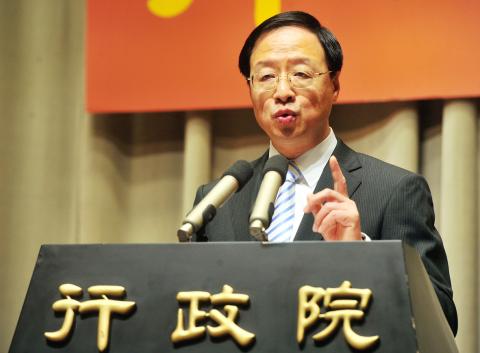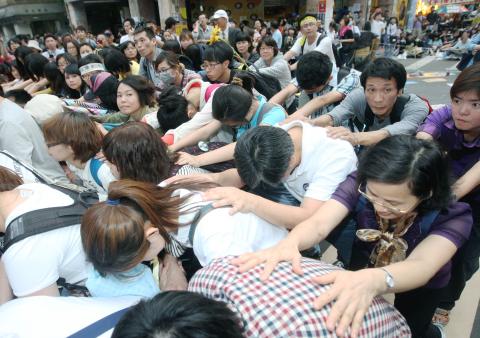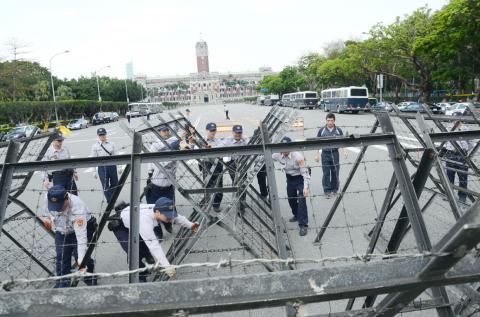Premier Jiang Yi-huah (江宜樺) yesterday defended the bloody crackdown on student protesters occupying the Executive Yuan from Sunday evening through early Monday morning as a necessary measure, while rejecting the protesters’ call to withdraw the cross-strait service trade pact or suspend its review until legislation to monitor cross-strait agreements is set up.
While expressing regret over the injuries suffered by both protesters and police, Jiang defended the police action as “necessary.”
“As the protesters were trying to take over the Executive Yuan, we had to ask the police to take harsh measures to disperse them. Officers and protesters were injured and, according to data provided by the National Police Agency, a total of 174 officers and protesters were injured, with more officers than protesters being hurt,” Jiang told a press conference at the Executive Yuan yesterday morning.

Photo: Chien Jung-fong, Taipei Times
“I would like to express my deep regret about the protest that got out of control, and the ensuing forced eviction, which was necessary,” he said.
The premier said he was open to the idea of setting up legislation that would monitor cross-strait agreements, but he would not withdraw the service trade agreement from the legislature or suspend its legislative review.
Responding to Jiang’s comments, a representative of the student protests, Shih I-lun (施懿倫), said the premier’s remarks were “meaningless” and “insincere.”

Photo: CNA
“Jiang has been making similar meaningless comments for a week, since he came to the Legislative Yuan on Saturday [to talk to the protesters]. It doesn’t make any sense to me when he says that he supports legislation to monitor cross-strait agreements, but also says that the service trade pact should not be monitored by the law,” Shih said.
As for Jiang’s defense of the violent crackdown, Shih said that President Ma Ying-jeou (馬英九) and Jiang should take full responsibility for the incident.
“The occupation was largely peaceful, with demonstrators staging a sit-in, chanting slogans. Violence only broke out when police, following Jiang’s order, starting the heavy crackdown on peaceful demonstrators,” Shih said.

Photo: Sung Hsiao-hai, Taipei Times
Jiang held the press conference after the student-led occupation movement earlier called on the public to attend an open-ended rally in front of the Presidential Office tomorrow afternoon.
According to Taipei City Zhongzheng First Precinct Police Chief Fang Yang-ning (方仰寧), the event organizers have applied for a permit for a rally of 100,000 people and the application has been approved. However, participants are required to disperse by midnight, he added.
Meanwhile, although a number of images, video clips and witness accounts have surfaced about police officers beating up protesters and reporters with batons and shields, Deputy Minister of the Interior Chen Chun-ching (陳純敬) and National Police Agency Deputy Director-General Tsai Chun-chang (蔡俊章) insisted yesterday that the police “gently” removed protesters occupying the Executive Yuan.
“It is true that 55 protesters were wounded, but the injuries were caused by the pulling and shoving that occurred when they resisted officers’ attempts to remove them,” Tsai said.
Asked about reports of police forcing reporters to leave and beating them, Chen said they asked members of the media to leave to protect them.
“If there is evidence that the police attacked reporters, we will launch an investigation,” he said.
Additional reporting by CNA

CHAOS: Iranians took to the streets playing celebratory music after reports of Khamenei’s death on Saturday, while mourners also gathered in Tehran yesterday Iranian Supreme Leader Ayatollah Ali Khamenei was killed in a major attack on Iran launched by Israel and the US, throwing the future of the Islamic republic into doubt and raising the risk of regional instability. Iranian state television and the state-run IRNA news agency announced the 86-year-old’s death early yesterday. US President Donald Trump said it gave Iranians their “greatest chance” to “take back” their country. The announcements came after a joint US and Israeli aerial bombardment that targeted Iranian military and governmental sites. Trump said the “heavy and pinpoint bombing” would continue through the week or as long

TRUST: The KMT said it respected the US’ timing and considerations, and hoped it would continue to honor its commitments to helping Taiwan bolster its defenses and deterrence US President Donald Trump is delaying a multibillion-dollar arms sale to Taiwan to ensure his visit to Beijing is successful, a New York Times report said. The weapons sales package has stalled in the US Department of State, the report said, citing US officials it did not identify. The White House has told agencies not to push forward ahead of Trump’s meeting with Chinese President Xi Jinping (習近平), it said. The two last month held a phone call to discuss trade and geopolitical flashpoints ahead of the summit. Xi raised the Taiwan issue and urged the US to handle arms sales to

BIG SPENDERS: Foreign investors bought the most Taiwan equities since 2005, signaling confidence that an AI boom would continue to benefit chipmakers Taiwan Semiconductor Manufacturing Co’s (TSMC, 台積電) market capitalization swelled to US$2 trillion for the first time following a 4.25 percent rally in its American depositary receipts (ADR) overnight, putting the world’s biggest contract chipmaker sixth on the list of the world’s biggest companies by market capitalization, just behind Amazon.com Inc. The site CompaniesMarketcap.com ranked TSMC ahead of Saudi Aramco and Meta Platforms Inc. The Taiwanese company’s ADRs on Tuesday surged to US$385.75 on the New York Stock Exchange, as strong demand for artificial intelligence (AI) applications led to chip supply constraints and boost revenue growth to record-breaking levels. Each TSMC ADR represents

State-run CPC Corp, Taiwan (CPC, 台灣中油) yesterday said that it had confirmed on Saturday night with its liquefied natural gas (LNG) and crude oil suppliers that shipments are proceeding as scheduled and that domestic supplies remain unaffected. The CPC yesterday announced the gasoline and diesel prices will rise by NT$0.2 and NT$0.4 per liter, respectively, starting Monday, citing Middle East tensions and blizzards in the eastern United States. CPC also iterated it has been reducing the proportion of crude oil imports from the Middle East and diversifying its supply sources in the past few years in response to geopolitical risks, expanding